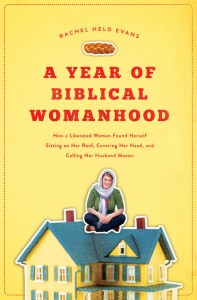A Year of Biblical Womanhood
Posted in Book Reviews on January 3rd, 2013by Elizabeth
Tags: Book Reviews • Feminism • Religion
Rachel Held Evans is an American Christian from Tennessee. Her book “A Year of Biblical Womanhood” is an attempt to live by according to the rules Bible prescribes out for women.
Evans writing is very accessible, and she’s immediately likeable. I do wish that she would have explained exactly what her theology is though. I see that on her blog she has said she is not a fundamentalist, but that doesn’t offer much. What exactly does she believe about the Bible? Her faith in God and Jesus are apparent, but after that I don’t know much about her beliefs. And if I don’t know what she believes, it’s hard to know what she’s asking for when she calls for reform in the way Christians view women and the Bible.
Each month, Evans focuses on a different aspect of Biblical Womanhood – modesty, purity, obedience, etc. Some people would call this a cop-out. But I understand why she did it. One of the overarching themes of the book is that any one rule could be emotionally crippling or logistically impossible. To follow them all at once would lead to burnout and not as interesting of a narrative. She studies each topic in depth and applies what she learns to the next.
One thing I was reminded of is that the Bible contains misogynist ideas that are still with us today. That women are gossips, that they lie about being raped, that they are the other and require special rules to be constrained.
I think the most fascinating part of the book was when Evans and some of her friends held a mourning ceremony to remember women in the Bible who were killed or abused. She was inspired by the passage in the Bible that says “From this comes the Israelite tradition that each year the young women of Israel go out for four days to commemorate the daughter of Jephthah.”
It’s easy to see why this book makes some Christians uncomfortable. She writes of Mary,
That a woman who managed to be both a virgin and a mother is often presented as God’s standard for womanhood and can be frustrating for those of us who have to work within the constraints of physical law.
She writes about her doubts, and her “pesky insecurities” in her faith, facing them head on.
Evans comes to the conclusion that there is “no such thing as Biblical womanhood.” There are too many contradictions, too many proscriptions and too many impossible demands for one woman to embody them all. It was gratifying for me to see her come to the conclusion she had been building all along. However, as a Unitarian Universalist, I am not limited to the Bible in my search for truth or in my spiritual practice. I am not bothered by the idea that it is possible to pick and choose what you need from the Bible. I think that Evans makes a strong case for this when she says that Christians should spend more time with the troubling parts of the Bible and not less. It’s important to understand why you believe what you believe and also why you reject what you do not believe.
Even if I’m not exactly sure how she defines it, Evans lives her faith and is not afraid to ask questions. This is a refreshing contribution to the discussion about the conflict between religion and feminism.



January 7th, 2013 at 7:44 am
The thing that always strikes me in the context of the Bible’s “respect” for women is that Jephthah’s daughter who was the one sacrificed (or not if you believe some apologists) is never named.